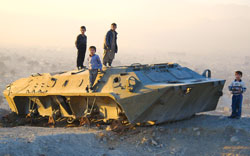 Not to minimise Nepal's challenges, but after a month or two in Afghanistan and Pakistan, it does seem as if there are countries with problems, and other places that just can't seem to get their act together. I'm afraid Nepal falls into the latter camp.
Not to minimise Nepal's challenges, but after a month or two in Afghanistan and Pakistan, it does seem as if there are countries with problems, and other places that just can't seem to get their act together. I'm afraid Nepal falls into the latter camp.
Just think of it. The Afghan people have faced 30 years of near- constant conflict mixed only with uncertainty. Their country has faced Communist coups, meddling from Moscow, an invasion by the late, unlamented Red Army, civil war, perpetual interference from neighbouring states, economic and infrastructural collapse, hundreds of thousands of deaths, the exodus of 5 million citizens fleeing war, famine, floods, earthquakes, international isolation, the brutal rule of the Taliban, bombardment by the US despite what Donald Rumsfeld called "a lack of targets", a growing narco-economy run by warlords with familiar faces and friends in Washington and lately, international involvement far short of what is required.
Yet Afghans remain resilient, proud and capable people. They have never lost hope, despite constant disappointments. They are good humoured, hospitable, and cultured. Poets and musicians thrive and are honoured. Guests are treated better than royalty. Food is lovingly cultivated and prepared and life celebrated, despite the frequently fatal crossfire between US-led forces and the resurgent Taliban.
As I wandered and filmed in Afghanistan recently I found islands of hope in what should have been a sea of despair. The United Nations led relief effort in the country is well-staffed and funded, but it lacks political leadership from the security-obsessed American and British authorities. Many Afghan provinces have little or no relief work going on because of fighting with cynical Islamo-nationalist forces more intent on kidnapping and violence than rebuilding their country. It's a grim picture but people still laugh, welcome you into their homes, and express hope that their children will enjoy life more than they have.
Then there's Pakistan. The wretched Lal Masjid affair produced no winners, only bloodstains and vengeful minds. President Musharaff has made some mistakes in his time but sending his crack commandos into a girl's school affiliated with a religious institution leads the pack. Suicide bombers have come out of the woodwork to attack Pakistani soldiers and police, men from poor backgrounds blown to bits on both sides of the explosion.
Musharaff's government tries and fails to maintain a moderate religious stance in a land that grows more committed to faith by the day. Secular forces are still powerful but in troubled times, people seek solace in culture, nationalism, and familiar patters of devotion. Pakistan's 87,000 mosques are full to bursting and even a cynical, westoxicated national elite is hedging its bets on the religion front. More and more children flock to religious schools that are supposed to teach proper Islamic principles of justice and peace, not the jihadist hate that blooms across a Muslim world under pressure.
Yet again Pakistan defies easy categorisation. The press is free, lively and critical. Deep analysis and investigative journalism are thriving and if the picture that emerges is gloomy, the sense of excitement in its emergence is contagious.
Pakistanis are also dignified, friendly people who long for better days but don't lose their sense of humour.
And what do I find in Nepal? A political elite with the means and resources to move forward but a fractious mindset that places point-scoring above the national interest. The old courtiers and royals rightly on the ropes but plotting their absurd comeback. Maoists who are either deceiving themselves on the grandest of scales or lying shamelessly to their dedicated, if overestimated, cadre. I find a country that faces very real problems but wants the United Nations to solve them, if only to have someone to blame when things go awry.
Perhaps it's time to cast an eye around the region, and to give thanks that things are not much, much worse.



